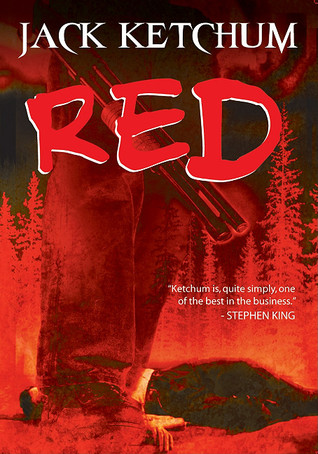 By JACK KETCHUM (Leisure; 1995/2002)
By JACK KETCHUM (Leisure; 1995/2002)
This is allegedly one of the nicer novels by the great Jack Ketchum, but I’m not so sure. It begins with a dog getting its head blown off and climaxes with a gory showdown that justifies the title.
Red happens to be the unfortunate dog and the sixtyish Avery Ludlow its traumatized owner. The killer is a callous teen, the son of a rich asshole named Michael McCormack. Ludlow attempts to get restitution for Red’s murder, or at least an apology, but McCormack’s brat feigns innocence and his father goes along. What follows is a campaign of harassment by both parties, with Ludlow following the McCormack kid around and eventually assaulting him, and McCormack responding in even more drastic fashion. It concludes with an apocalyptic confrontation on McCormack’s doorstep, followed by a nighttime shootout that very few will survive.
RED (made into a pretty good movie) sees Jack Ketchum in the staunchly reality-based mode of his other nineties novels THE GIRL NEXT DOOR and STRANGLEHOLD, with an emphasis on justice and morality. A long way, in other words, from Ketchum bloodbaths like OFF SEASON and LADIES’ NIGHT, although the harshness of his vision and the superbly pared-down prose are constants.
RED excels in other areas, most notably that of characterization: Avery Ludlow is one of Ketchum’s most compelling, fully rounded characters. As the story advances we’re made privy to Ludlow’s tragic past, from where his mania for justice emerges. Ludlow, it transpires, had a teenage son of his own who killed his mother and younger brother. Thus, he’s not only trying to discipline McCormack’s son, but also save him from the madness that claimed his own boy.
I’ll confess I found a romance between Ludlow and a newscaster half his age less than convincing (Ketchum seems to feel the same way, as he largely removes the news lady from the picture before the final showdown), and I’ve got mixed feelings about the happy ending. I believe the conclusion is why this novel is considered Ketchum’s nicest book, and while it’s largely earned (I liked seeing poor old Ludlow finally get a break), the wrap-up is a mite too pat.
But the novel is still a tough and engrossing one. I’m convinced that were it packaged as a mainstream thriller it would have won Ketchum a greater critical acceptance and much vaster audience. As it is, though, RED took several years to make it to the US (for a long time it was available only as a UK import) and then appeared as a horror paperback. Not that there’s anything wrong with that, especially since that paperback contained a stand-alone novella along with the novel.
That novella is “The Passenger,” and it’s a mean one. It has a woman attorney unwisely accepting a ride with another woman claiming to be a high school chum. The resulting car ride begins innocently enough, but takes a dark turn when the driver begins displaying a temper.
This is just the beginning of the protagonist’s nightmare, and neither she nor we have any idea of just how sordid things will get. Before long the increasingly unhinged driver meets up with a gang of sociopathic scumbags who happen to be her confidents, and the madness really begins!
In “The Passenger” we’re made privy to the fact that the disturbing power of Ketchum’s fiction isn’t due to the violence, which isn’t nearly as graphic as is often claimed, but its sheer relentlessness. In true Ketchum fashion, “The Passenger” plunges us into the darkest, ugliest depths of insanity—and as you might guess, finding one’s way back from there is no easy task!
